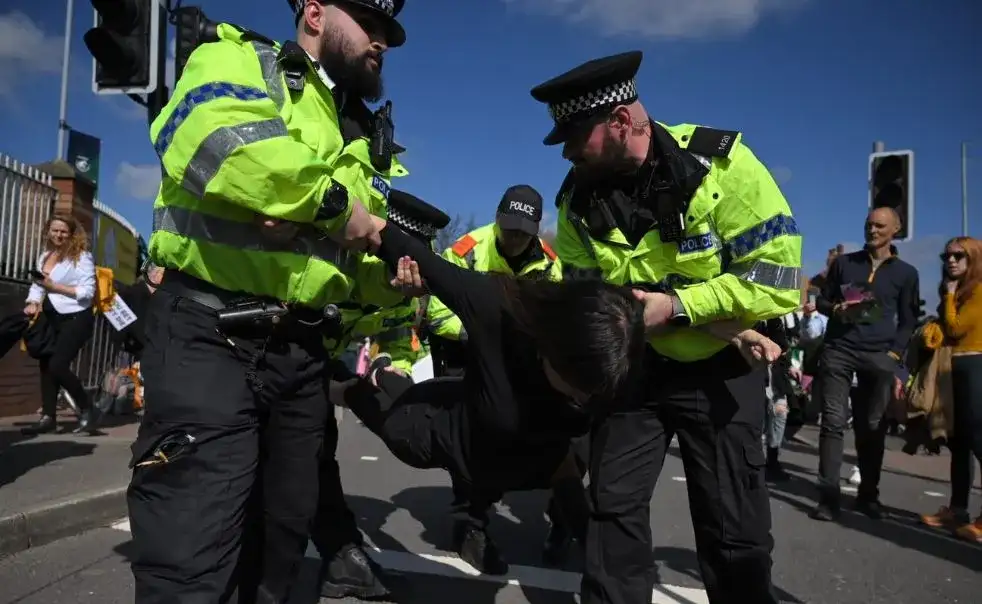Six Activists Cleared in Grand National Protest Case

Elle
Sep 25th 2025
Likes
Share:
Six animal rights activists were cleared of charges relating to public nuisance after they protested at the Grand National horse race. The decision was announced by a jury at Liverpool Crown Court, ending a trial which raised the issue of the treatment of animals in horse racing; horse welfare went unheeded by the media.
At the Aintree Grand National Protest meeting in April 2023, a significant demonstration interrupted the illustrious event. Nine activists climbed boundary fences and entered the track just before the race began, while some of them were attaching their hands to fences and jumps with adhesive. Their actions forced a delay to the start of the race, while others attempted to glue themselves to security fencing before being removed by police. Merseyside Police arrested 118 people in connection with the disruption, citing allegations of public nuisance and criminal damage.
The six defendants, all members of the campaign group Animal Rising, denied the charges and presented a defence based on what is known as “reasonable excuse” within public nuisance law. The declaration was them claiming that their actions were correct to end the torment of horses, by keeping that the Grand National as well as other races put animals into dangerous surroundings. After the jury had heard the evidence, it returned a unanimous decision of acquittal for all the six defendants.
Animal Rising was very pleased with the verdict, saying that it was a reflection of public worry about the well-being of the horses used in races. The organization stated the decision showed that the jury, as a group of normal people, did not regard the action as a crime because the Grand National Protest was the closest means of communication with the victims.
Throughout the trial, the activists presented data supplied by Animal Aid, a UK-based animal rights organization, stating that over 3,000 equine fatalities on racecourses all over the UK have been recorded since 2007. The group reports that three horses were killed at the 2023 Grand National protest meeting, while a fourth horse, infected by a wound it had sustained at the event, is said to have died. The campaigners characterized the four-mile race with 30 jumps as a nightmare for the horses’ welfare, citing injuries, exhausting training regimes, and the use of whips as signs of abuse of the animals.
After the decision, one of the protesters, 22-year-old Sarah McCaffrey from Glasgow, suggested that the prohibition of horse racing be implemented throughout the country instead of going on horseback and causing more in the Grand National Protest. In her statement issued outside the court, she mentioned that from the time the Grand National protest had taken place, hundreds of horses had died in the racing industry and appealed to the Sports Minister, Lisa Nandy, to make a move. McCaffrey accused the racing industry of using horses as mere products from which they could make money, rather than as living beings, and claimed that caring for animals was pushed down the priority list under the racing billion-dollar business.
The Grand National, which is among the most popular sports events in the UK that are heavily televised, has been under fire from all sorts of animal rights groups for years. They claim that the blend of difficult jumps, huge numbers of horses running, and long distances makes the occurrence of mishaps and deaths highly probable. People who are in favor of the sport, nevertheless, say that it is carried out under very strict rules for the protection of animals, whereby thorough health checks by vets and the installation of safety measures at the racecourse form an integral part.
The court’s decision marks the first outcome in a series of trials connected to the 2023 Grand National Protest. Twenty-three other members of Animal Rising are due to face similar charges in separate hearings. Another trial is scheduled to begin next week, with further cases expected to follow.
The Grand National protest was noticed by the national media and fueled the discussion about the morality of horse racing. Despite the verdict not having an impact on existing regulations, it can still have an effect on the opinion of the public and on the legal assessment of further such protests. Legal analysts pointed out that the jury’s acceptance of the ‘fair justification’ defence might establish an important precedent in direct action cases on animal welfare grounds.
That Animal Rising declares that it will keep campaigning against horse racing and other sports that involve animals. The group claims the public is gearing up for a greater concern regarding these phenomena, such as intensifying tensions against the racing industry and growing demands for reform.
The Grand National protest remains one of the most significant events in the British sporting calendar – one that attracts millions every year while also inviting copious amounts of betting spending. Although there is still heavy criticism for the race, it seems to enjoy continual backing from racing authorities and a large majority of the general public. The acquittal of the six activists now brings another angle into the current debate on balancing public order, rights to Grand National Protest, and taking care of animals in sports.
Despite all the criticism, the race does get a lot of support from the racing authorities, and many members of the public view the potential televised exposure this event attracts as the millions of punters every year. The acquittal of six activists will now add a new dimension to the ongoing debate with regard to balancing public order, rights of protests, and treatment of animals in sport.
